
Introduction
Nyquil is a popular over-the-counter medication used to relieve symptoms of cough, colds, flu, and allergies. However, it has become known for its sleep-inducing properties as well. Many people turn to Nyquil for a good night’s rest, whether they are battling a minor ailment or dealing with occasional insomnia. But have you ever wondered why Nyquil makes you feel so sleepy? In this article, we will explore the science behind Nyquil and its sleep-inducing properties, as well as its benefits and risks.
The Science Behind Nyquil: How Its Ingredients Induce Sleepiness
Nyquil contains several active ingredients that work together to relieve symptoms and promote sleepiness. The primary ingredients in regular Nyquil include acetaminophen (pain reliever/fever reducer), dextromethorphan (cough suppressant), and doxylamine succinate (antihistamine). Together, these ingredients can cause drowsiness and help you fall asleep faster.
Dextromethorphan, commonly known as DXM, interacts with the brain’s receptors responsible for suppressing the urge to cough. It causes a mild sedative effect that can help you relax and fall asleep. At the same time, doxylamine succinate blocks histamine receptors in the brain, reducing wakefulness and promoting drowsiness.
Compared to other sleep aids on the market, Nyquil may not be as potent as prescription sleeping pills. However, it can be effective for occasional sleeplessness or as a mild sleep aid.
Sleeping Better with Nyquil: Unpacking the Complexities of its Formula
In addition to the active ingredients above, Nyquil also contains other ingredients that can aid sleep. For example, alcohol is a common ingredient in Nyquil, which can enhance the sedative effect of DXM and doxylamine succinate. However, excessive alcohol intake can lead to adverse effects and should be avoided.
Nyquil also contains flavors and sweeteners to improve its taste, as well as inactive ingredients such as sodium, citric acid, and high fructose corn syrup. It is important to follow dosage instructions carefully to avoid overconsumption of these ingredients.
There are also several variants of Nyquil on the market, such as Nyquil Severe and Nyquil Zzz. Nyquil Severe contains additional pain relievers and decongestants to relieve more severe symptoms. Nyquil Zzz, on the other hand, contains only the sleep-inducing ingredients and is formulated specifically for sleeplessness.
The Dangers of Nyquil Abuse: Understanding Its Sedative Effects
While Nyquil can be an effective sleep aid, it can also be dangerous if misused. Taking Nyquil in excessive amounts or for an extended period can lead to dependency, abuse, and various side effects such as dizziness, confusion, and breathing problems. Drinking alcohol while taking Nyquil can also lead to severe sedation and increase the risk of liver damage.
It is essential to use Nyquil responsibly and follow dosage instructions carefully. If you are experiencing frequent or persistent sleeplessness, it is also important to consult a healthcare provider for proper diagnosis and treatment.
The Body’s Response: Exploring Why Nyquil Makes You Feel Sleepy
Nyquil interacts with the body’s natural sleep processes, promoting drowsiness and improving sleep quality. However, individual factors such as weight, metabolism, and tolerance can impact Nyquil’s effects on the body. Taking Nyquil with food can slow down its absorption and reduce its effectiveness, while taking it on an empty stomach can lead to faster absorption and stronger sedation.
To optimize Nyquil’s sleep-inducing effects, it is essential to maintain healthy habits such as regular exercise, a balanced diet, and good sleep hygiene. Additionally, avoiding caffeine, alcohol, and other stimulants before bedtime can help Nyquil work more effectively.
Choosing Nyquil for Nighttime Relief: The Benefits and Risks of Its Sleep-Inducing Properties
When it comes to choosing a sleep aid, Nyquil is a popular option for its effectiveness and affordability. Compared to other herbal remedies or prescription sleeping pills, Nyquil may be more accessible and easier to obtain. It can help relieve minor ailments and promote restful sleep, making it a useful tool for occasional sleeplessness.
However, it is important to be aware of its risks and limitations. Nyquil should not be used as a long-term solution for chronic sleep problems, and excessive use can lead to dependency and negative side effects. It is essential to use Nyquil responsibly and consult with a healthcare provider if necessary.
Conclusion
In conclusion, Nyquil can be an effective and accessible option for occasional sleeplessness and symptom relief. Its active ingredients, such as DXM and doxylamine succinate, work together to promote sleepiness and improve sleep quality. However, it is essential to use Nyquil responsibly and follow dosage instructions carefully to avoid mishaps and negative side effects. If you are experiencing persistent sleep problems or have concerns about Nyquil’s safety, it is important to consult a healthcare provider for proper diagnosis and treatment.




